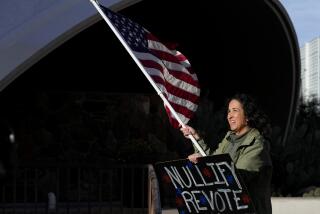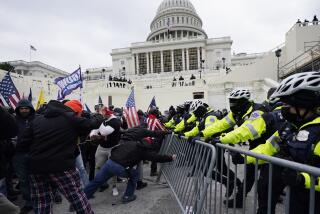Dornan-Sanchez Dispute Has Familiar Ring in This Indiana City
- Share via
EVANSVILLE, Ind. — Try to tell folks in this graying industrial city about Robert K. Dornan and Loretta Sanchez, and they will tell you they have heard it all before.
A super-close congressional election. The winner heading to Washington unsure of final victory. The loser crying foul.
“I don’t think about it much anymore,” said Rick McIntyre, a youthful-looking judge in a town just north of here. “But that was one of the nastiest fights I was ever caught up in.”
Thirteen years ago, McIntyre lost one of the closest congressional races in U.S. history. With his opponent and him a few votes apart, a Democratic-controlled House swooped in from Washington, counted the ballots its own way and handed the victory to the Democrat.
Weeks later, 179 Republican congressmen stormed out of the U.S. Capitol to protest what they called a stolen election.
The lesson that many took away from the Indiana race was that the party that controls Congress decides the close elections.
This time--in the voter fraud dispute between former Republican Rep. Dornan and current Democratic Rep. Sanchez, both of Garden Grove--the Republicans are in charge.
People who have studied the 1984 Indiana race, one of only a handful in this century decided by a vote of the House of Representatives, say it is directly relevant to the Dornan-Sanchez dispute. It suggests that the Republicans can exercise sweeping authority in deciding who won. Though it is unlikely, they could call for a new election even though they do not come up with fraudulent ballots numbering 984--the margin by which Sanchez beat Dornan.
The courts and the Constitution, the experts note, make Congress the final judge of who sits in its chambers.
“That race set a terrible precedent, it was a nightmare, and nobody wants it to ever happen again,” said Mark Braden, counsel to the House Oversight Committee and a veteran of the Indiana showdown. “But one thing that election made clear was that Congress is free to do pretty much whatever it wants.”
Some experts, however, say Congress would hesitate before taking the drastic step of removing one of its members for a fleeting partisan advantage.
“Congress would be very reluctant to do anything that made it look like they were stealing an election,” said Charles Tiefer, former deputy counsel to the House of Representatives and now a professor at the University of Baltimore.
Right now, the Republicans say that they want to fully investigate Dornan’s claims of voter fraud and that they won’t call a new election unless Dornan can show he would have won without the fraud.
So far, Dornan doesn’t have enough evidence. Sanchez beat him by 984 votes. California Secretary of State Bill Jones found that as many as 303 people registered before they became citizens and then voted in the 46th Congressional District race.
Those numbers could change. Rep. Bill Thomas (R-Bakersfield), chairman of the House Oversight Committee, is demanding that the Immigration and Naturalization Service check the citizenship of all of Orange County’s 1.3 million registered voters. If the INS finds that more noncitizens cast ballots, Congress could be faced with deciding whether to invalidate the November results and hold a new election.
And that, experts say, is where the 1984 contest in Indiana’s 8th Congressional District--dubbed the “Bloody 8th”--offers clues to how Congress might act.
“The Indiana race was the ugliest and most spectacular contested election in the 20th century,” said Bill Kimberling, a deputy director of the Federal Elections Commission.
The contest between an incumbent Democrat, Frank McCloskey, and the Republican McIntyre began quietly enough. They faced off in a 15-county district that spanned Evansville, a city of 130,000, and a mostly rural outlying area that includes the town of French Lick, best known for producing basketball star Larry Bird.
Ronald Reagan was at the peak of his popularity, and McIntyre hoped to sweep into Washington on the coattails of the incumbent president.
On election night, however, McCloskey appeared to have beaten back his Republican challenger by a mere 72 votes out of 233,610 cast.
The next day, election workers in two precincts in rural Gibson County discovered that they had mistakenly passed the ballots through the counting machine twice. When they subtracted the extra ballots, McIntyre, the Republican, appeared to have won by 34 votes.
*
With that, Indiana’s secretary of state, also a Republican, handed McIntyre his certificate of victory. And the official recount later declared that he had won by 418 votes. Under Indiana law, designed to guard against voter fraud, 4,800 ballots were not counted because they had been improperly completed.
But when McIntyre came to Washington, then-Majority Leader Jim Wright refused to seat him.
“The election procedures to date have simply not yielded a result on which the House can rely,” Wright said as McIntyre stood nearby.
The Democratic-controlled House dispatched a task force to Evansville to determine who had won the election.
Three congressmen sat on the task force: Reps. Leon Panetta of California and William Clay of Missouri, both Democrats; and Bakersfield’s Thomas, the Republican now handling the Dornan-Sanchez dispute.
Richard Young, an attorney who represented McCloskey, remembers when the task force came to Evansville.
“They made it clear that they were going go to do things their own way,” said Young, who is now a judge. “They ran their own show.”
Said Joseph H. Harrison, a Republican on one of the local election committees, “Their approach was: ‘We really don’t care what you think down here.’ ”
At the direction of the Democratic-dominated task force, a team of federal election workers received specific instructions: Instead of adhering to Indiana law, they were to go through all the ballots again and try to determine “voter intent.”
That meant that many of the excluded 4,800 ballots would be counted if election workers could determine who the voter was trying to choose.
*
The Democrats asserted that Indiana’s Republican officials had disqualified ballots improperly, and said race and geography played a role in throwing out votes from predominantly black and Democratic districts around Evansville.
The critical moment came when the task force had to decide whether to count 32 absentee ballots that lacked signatures or notarization--after having decided to count a similar batch of such ballots. This time, the task force voted 2-1, along party lines, not to count the ballots. The Democrats said they were not certain the ballots were secure.
That made the Democrat, McCloskey, the winner by four votes. His victory ignited a firestorm of anger among the Republicans.
“It was a rape,” Thomas said at the time.
McIntyre appealed repeatedly to the federal courts but was rebuffed. The judges cited the U.S. Constitution, which deems Congress the “judge of the elections, returns and qualifications of its own members.”
On May 1, 1985--almost six months after the election--the House voted to seat McCloskey. Ten Democrats, however, crossed the aisle and voted with the Republicans, many of whom wore buttons that said: “Thou shalt not steal.”
*
The Democratic majority countered that the Republicans would have found fault in any process that did not name McIntyre the winner.
“I believe that if the College of Cardinals had conducted their recount and found for someone not to their liking, the Republicans would accuse God of stealing the election,” task force member Clay said.
Today, the wall of McIntyre’s office still displays the state of Indiana’s certificate declaring him the winner. On another wall is a framed photograph of him standing with the Republican congressmen who walked out of the Capitol.
“If they had counted the votes fairly,” McIntyre said, “I would have won.”
Thomas, who is overseeing Dornan’s election challenge, dismisses as “hogwash” any suggestion that he is seeking revenge for what the Democrats did back then. “I want to create a fair process that will never, ever result again in what happened to the Republicans,” he said.
Yet Thomas was equally forceful when he said the House is free to decide the Dornan-Sanchez race in any way it sees fit. “Congress, not the courts, will decide this,” he said.
But Stanley Brand, former counsel to the House and now an attorney for Sanchez, said the courts would step in if House Republicans tried to unseat Sanchez without convincingly demonstrating widespread voter fraud. “The Supreme Court will rein in Congress when it acts in an unconstitutional way,” Brand said.
In 1969, the high court ruled that Congress erred when it refused to seat New York Rep. Adam Clayton Powell, who had been accused of misconduct.
*
But most contested elections are left up to Congress. It has on a few occasions ordered a new election. According to the Federal Elections Commission, some 500 House elections have been contested but a congressman who has been officially seated has never been ousted. In the Indiana election, the seat was kept open until the task force decided who had won.
Whether Dornan gets a rematch may turn not merely on how many invalid ballots he finds, but on how many friends he has in Congress. Back in 1984, the Democrats outnumbered Republicans by a 70-vote margin. Today, the Republican majority is just 21.
“I don’t think the Republicans will go to the mat for Bob Dornan,” said Sanchez chief of staff Steve Jost. “He wasn’t popular on either side of the aisle.”
Times researcher Robin Cochran in Washington contributed to this story.
More to Read
Get the L.A. Times Politics newsletter
Deeply reported insights into legislation, politics and policy from Sacramento, Washington and beyond. In your inbox twice per week.
You may occasionally receive promotional content from the Los Angeles Times.










